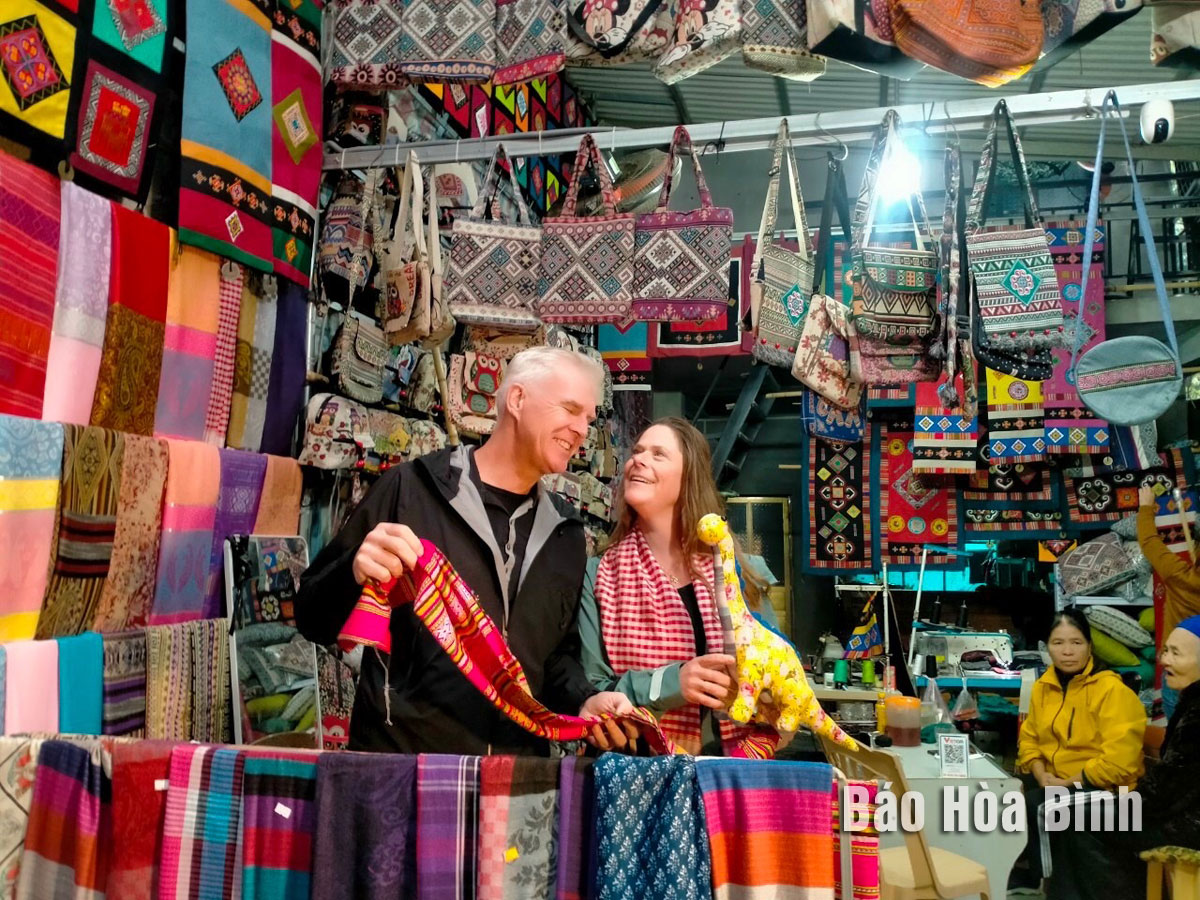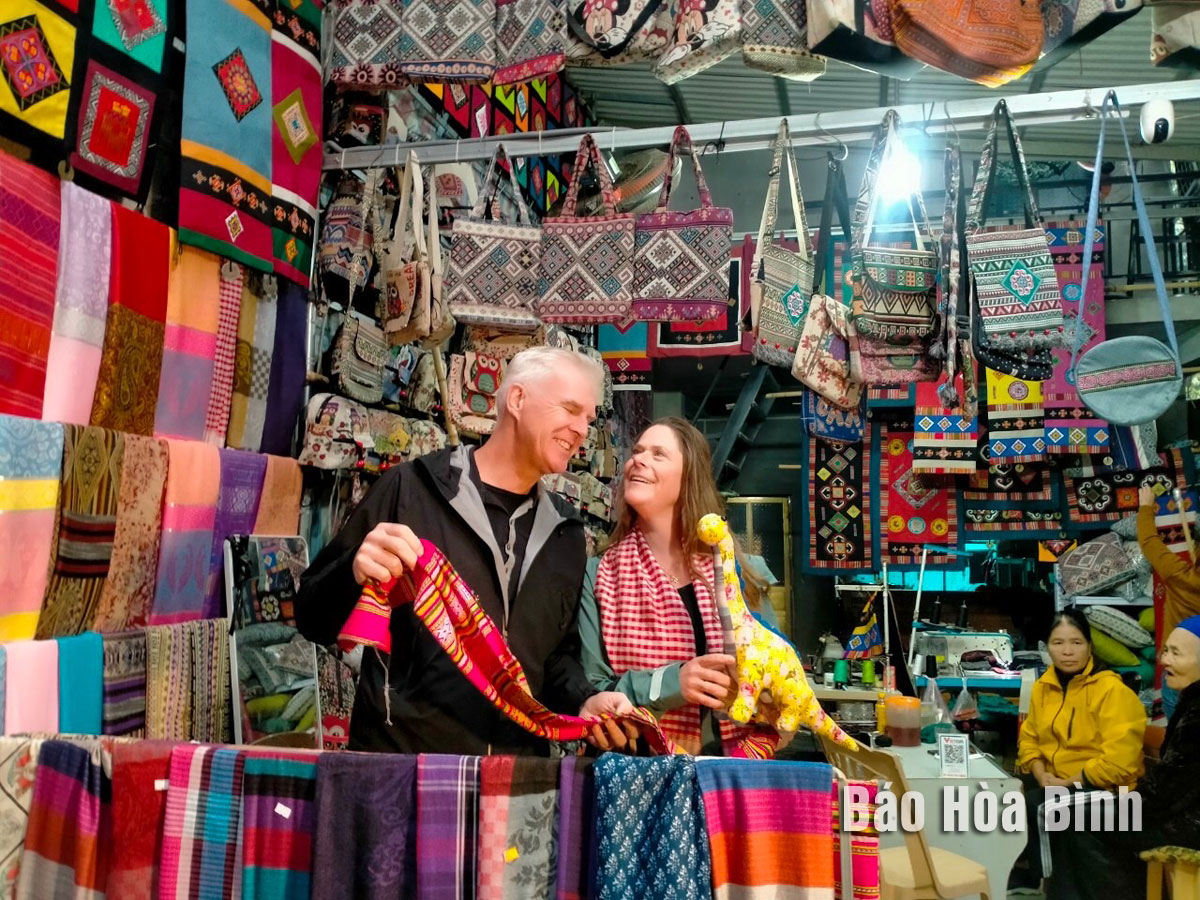
F. Martine from France and many other tourists from around the world have shown their excitement when joining Thai ethnic people of Mai Chau district in the traditional "sap” and "keng loong” dances.
Photo: By turning culture into a tourism product, Mai Chau
district has welcomed tens of thousands of international visitors each year.
(Photo: F. Martine and her husband from France experience special cultural
identities of ethnic groups in Mai Chau district).
Culture turned into
tourism product
F.Martine said she is very excited to try the
energetic "sap” dance (a dance with bamboo poles), adding that all people dance
hand in hand and all are very friendly.
like the French tourist, many other foreign
visitors to Mai Chau are also surprised by the creativity of locals who
invented various dances and sounds from just simple bamboos, poles or tree
trunks.
Lo Van Hep, Vice Chairman of the People’s
Committee of Na Phon commune, said "sap” and "keng loong” dances were
previously performed only in traditional festivals. However, with the strong
development of community-based tourism, many travellers have come and expressed
their wish to learn about and experience the culture of local ethnic groups. To
meet their demand, hamlets in his commune established musical troupes to help
tourists experience "sap” and "keng loong” dances, thereby helping preserve and
introduce the culture of the local Thai Trang (White Thai) ethnic people.
Hoang Duc Minh, Vice Chairman of the People’s
Committee of Mai Chau, said that the district, home to diverse ethnic groups
and rich traditional culture, has tapped into its beautiful natural landscapes
and special cultural identities to attract tourists and gradually turn tourism
into a key economic sector.
The preservation and promotion of ethnic groups’
cultural heritage in community-based tourism have been carried out effectively.
Particularly, Mai Chau has worked to uphold the costumes, folk songs and folk
dances, along with the traditional looms and stilt houses of Thai people. That
has helped visitors learn about local cultural identities and turn culture into
a unique tourism product drawing domestic and international tourists to the
district.
Archaeological relic
sites transformed into tourist destinations
Over the recent past, Mai Chau has gradually
turned archaeological relic sites into destinations for travellers.
Ngan Van Tuan, head of the district’s culture
and information division, noted there are now five historical, cultural, and
landscape relic sites recognised by the Ministry of Culture, Sports and Tourism
in Mai Chau, namely Khoa Cave (Xam Khoe commune), Mo Luong and Chieu caves (Mai
Chau township), and Lang and Pieng Kem caves (Chieng Chau commune). Among them,
Khoai and Lang caves are among the 10 typical archaeological sites of the Hoa
Binh Civilisation and listed as national-level ones.
To bring into play the special values of those
archaeological sites, the district has carried out a number of measures,
including capitalising on the sites for tourism development. Archaeological
findings have shed light on the formation and development of the Hoa Binh
Civilisation and also created chances for Mai Chau to diversify cultural
tourism products to serve local residents and visitors’ exploration and
research demand, he went on.
Mai Chau will mobilise resources for preserving
cultural heritage and bringing into play archaeological sites’ values to fuel
tourism development, the official added.
A diverse chain of eco-tourism and resort destinations concentrated in Hoa Binh city and the districts of Tan Lac, Da Bac, and Luong Son… Along with the launch of several key high-quality resort tourism projects, these developments have reshaped the landscape and enhanced the appeal of Hoa Binh as a travel destination.
Boasting diverse terrain, a mild climate, and rich natural resources, Cao Phong district is increasingly asserting its place on Vietnam’s tourism map, attracting both domestic and foreign visitors. The district is renowned for its stunning landscapes, majestic mountains, a crystal-clear hydropower lake, and the unique cultural identity of local ethnic groups.
With its pristine landscapes, unique cultural heritage of Muong ethnic minority, and an expanding range of visitor experiences, Tan Lac district of Hoa Binh has fast become a captivating destination for both domestic and international tourists.
Until now, Sung village in Cao Son commune, Da Bac district remains the only Dao ethnic community in Hoa Binh province to develop a community-based tourism model. Beyond its untouched natural landscapes, cultural identity serves as the cornerstone attraction for visitors.
Alongside the diverse cultural identities of the Kinh, Muong, Tay, Thai, Dao, and Mong ethnic people, Hoa Binh province is also renowned as the "capital" of the northwestern Vietnamese cuisine, offering unique and distinctive dishes. At festivals, during Lunar New Year (Tet), or on significant family or community occasions, special dishes are prepared, leaving a lasting impression on visitors.
A Phong Linh (Yellow Tabebuia) flower garden in Thang village, Thach Yen commune, Cao Phong district is currently in full bloom, drawing a large number of visitors.



